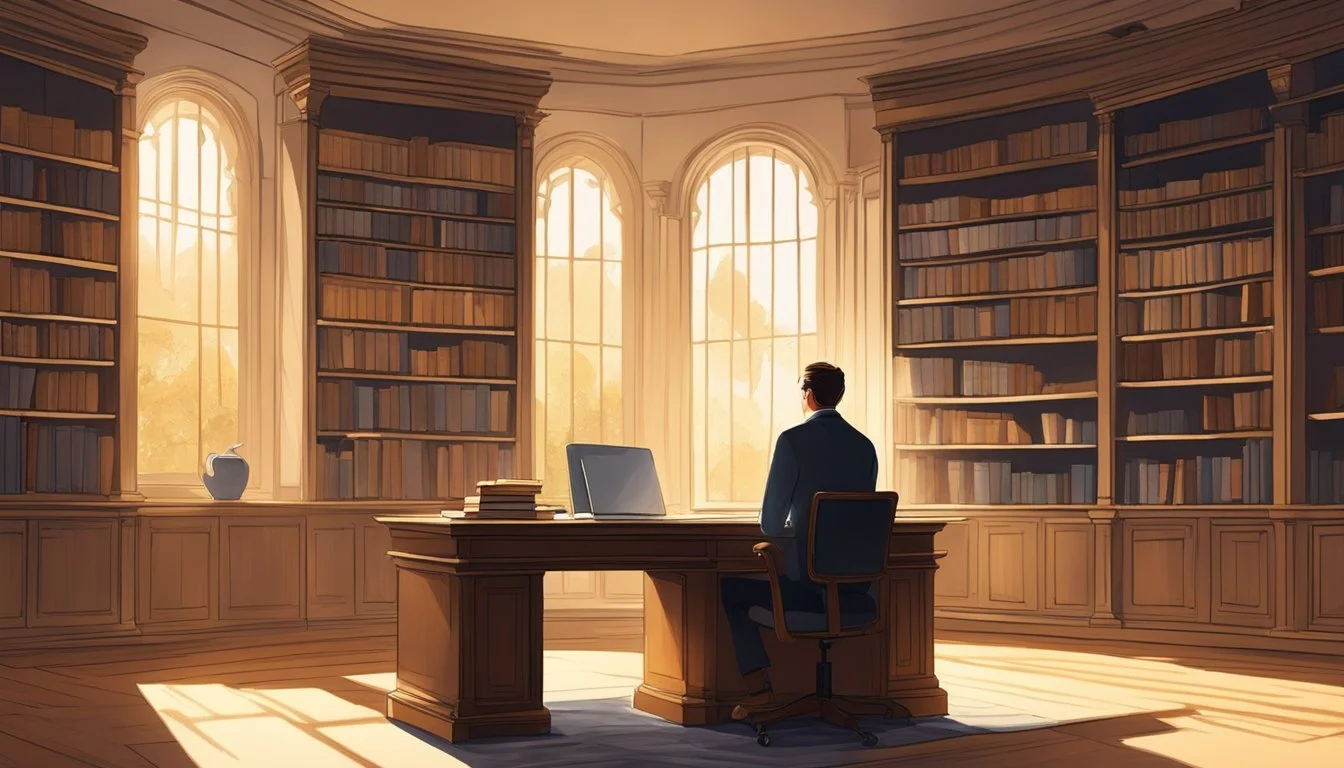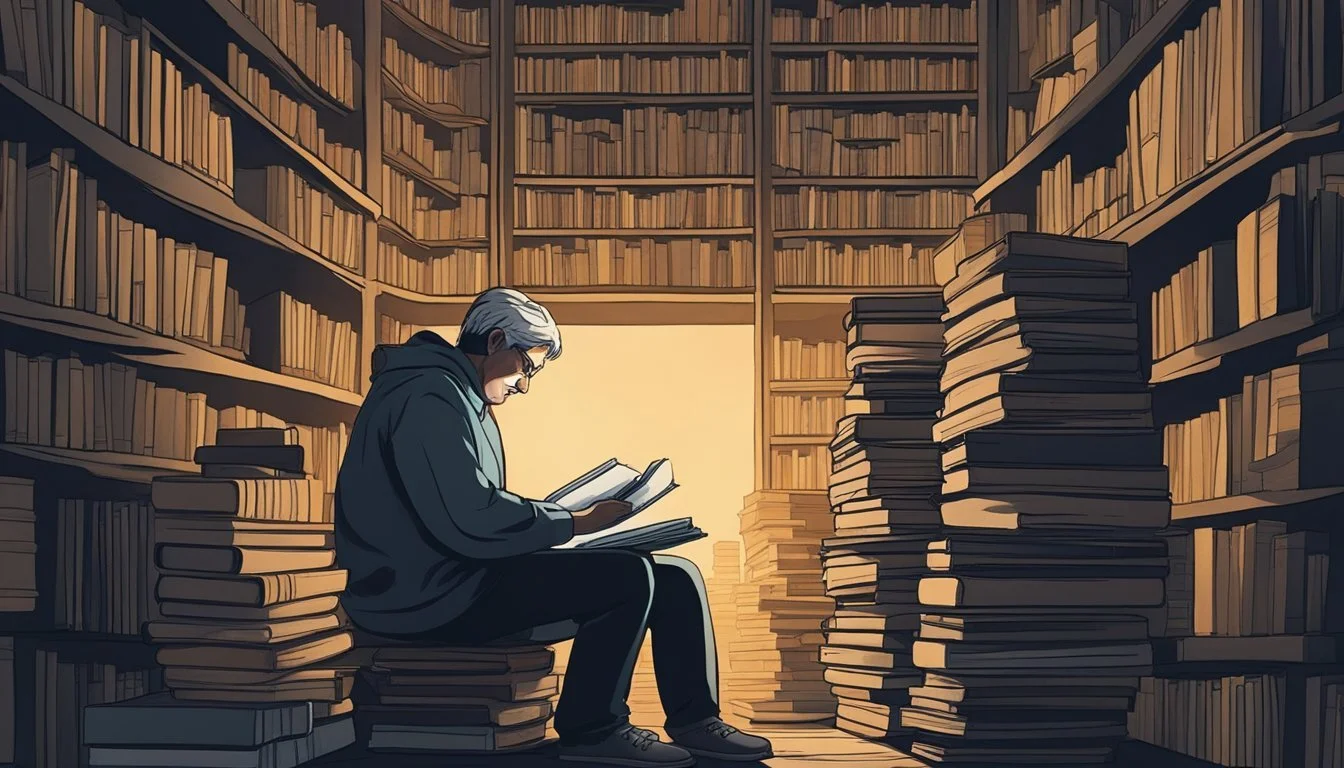Literary Luminary: Lord Bragg's Battle with Depression
A Journey Through Dark Times
Lord Melvyn Bragg, renowned broadcaster and author, has been a prominent figure in British media for decades. Behind his successful career lies a deeply personal struggle with depression that began in his youth. At age 12, Bragg experienced a "mental crash" that left him frightened every day about what would happen.
Bragg's openness about his battles with mental health has helped shed light on the often-hidden struggles of public figures. Despite facing severe depression in his teens and twenties, he went on to achieve remarkable success in literature and broadcasting. His journey demonstrates that mental health challenges need not be insurmountable barriers to accomplishment.
The veteran broadcaster's willingness to share his experiences offers hope and encouragement to others facing similar difficulties. By speaking out, Lord Bragg has contributed to the ongoing conversation about mental health, helping to reduce stigma and promote understanding.
The Life and Career of Melvyn Bragg
Melvyn Bragg's journey from a small Cumbrian town to becoming a cultural icon spans decades of broadcasting, writing, and arts advocacy. His multifaceted career has left an indelible mark on British media and literature.
Early Life in Cumbria
Melvyn Bragg was born in 1939 in Wigton, Cumbria. His childhood in this rural market town shaped his perspective and later influenced his work. Bragg's parents ran a pub, exposing him to a variety of local characters and stories.
His early experiences in Wigton fostered a deep appreciation for regional culture and dialects. This connection to his roots would later inform his writing and broadcasting, often featuring themes of class and northern English life.
Education at Wadham College
Bragg's academic journey led him to Wadham College, Oxford. He studied Modern History, graduating in 1961. His time at Oxford broadened his intellectual horizons and exposed him to diverse ideas and cultural movements.
At Wadham, Bragg honed his writing skills and developed a keen interest in literature and the arts. This period laid the foundation for his future career as a cultural commentator and author.
Rise to Prominence in Broadcasting
Bragg joined the BBC as a general trainee in 1961. He quickly rose through the ranks, showcasing his talent for engaging with complex subjects. In 1978, he created and began presenting The South Bank Show, a groundbreaking arts program.
His work on Radio 4's In Our Time, which he has hosted since 1998, cemented his reputation as a skilled interviewer and intellectual. Bragg's ability to make challenging topics accessible to a wide audience became his hallmark.
A Celebrated Author
Alongside his broadcasting career, Bragg established himself as a prolific author. He has written over 20 novels, exploring themes of love, class, and the human condition. His non-fiction works cover a range of subjects, from the history of the English language to biographies of historical figures.
Notable works include:
"The Adventure of English" (2003)
"The Book of Books" (2011)
"Now is the Time" (2015)
Bragg's writing often draws on his Cumbrian roots and personal experiences, blending historical research with compelling storytelling.
Notable Contributions to the Arts
Bragg's influence extends beyond broadcasting and writing. He has been a vocal advocate for the arts in Britain. His leadership of The South Bank Show for over 30 years brought cutting-edge artists and performers to mainstream audiences.
In 1998, Bragg became a life peer, taking the title Lord Bragg of Wigton. He has used this platform to champion arts education and funding. His contributions to British culture were recognized with a CH (Companion of Honour) in 2017.
Bragg continues to be an active voice in cultural debates, regularly contributing to discussions on literature, history, and the role of the arts in society.
Bringing Mental Health to the Fore
Lord Bragg's personal struggles with depression catalyzed his efforts to increase public awareness of mental health issues. He leveraged his platform to advocate for greater understanding and support for those battling mental illness.
Personal Struggle with Depression
Lord Bragg first experienced depression in his twenties. The condition plagued him intermittently throughout his life, often coinciding with periods of intense stress and work pressure. He described feeling a "black cloud" descending, leaving him unable to find joy in daily activities.
Despite his success, Bragg grappled with self-doubt and anxiety. He sought treatment through therapy and medication, finding relief but acknowledging the ongoing nature of managing his mental health.
Public Discourse on Mental Illness
Bragg's decision to speak openly about his depression helped normalize discussions around mental health. In interviews and his memoir, he detailed his experiences, breaking down stigma surrounding mental illness.
His candor encouraged others in the public eye to share their stories. This collective openness fostered a more supportive environment for those struggling with mental health issues.
Bragg emphasized the importance of seeking help, noting the crucial role of NHS mental health services in his recovery journey.
Advocacy for Mental Health Awareness
Lord Bragg became a vocal advocate for mental health awareness and improved access to care. He participated in campaigns to increase funding for mental health services within the NHS.
His efforts included:
Speaking at mental health conferences
Supporting mental health charities
Advocating for workplace mental health programs
Bragg's influence helped bring mental health issues to the forefront of public discourse. He stressed the need for early intervention and continued support for those battling depression and other mental illnesses.
Literary Contributions
Lord Melvyn Bragg's literary career spans decades, encompassing novels, non-fiction works, and memoirs. His writing often explores themes of identity, memory, and the human experience, with a particular focus on his Cumbrian roots.
The Cumbrian Trilogy
Bragg's Cumbrian Trilogy consists of three novels: "The Hired Man," "A Place in England," and "Kingdom Come." These works delve into the lives of working-class characters in rural Cumbria across generations.
"The Hired Man" (1969) tells the story of John Tallentire, a farm laborer in the early 20th century. The novel vividly portrays the harsh realities of agricultural life and social change.
"A Place in England" (1970) continues the family saga, focusing on Joseph Tallentire's experiences during World War I and its aftermath.
"Kingdom Come" (1980) completes the trilogy, exploring the post-war era and the changing face of rural Britain.
Remember Me: A Memoir
"Remember Me" (2008) is Bragg's poignant memoir that recounts his mother's battle with dementia. The book offers a deeply personal account of love, loss, and the power of memory.
Bragg interweaves his mother's story with reflections on his own childhood in Wigton, Cumbria. He explores the impact of her illness on their relationship and his understanding of identity.
The memoir received critical acclaim for its honest and moving portrayal of a family coping with Alzheimer's disease.
Fictional Works and Themes
Bragg's fiction often tackles complex themes and historical subjects. "A Time to Dance" (1990) explores love and aging through the story of an older couple's passionate affair.
"Grace and Mary" (2013) examines family relationships and the nature of memory, drawing on Bragg's experiences with his mother's dementia.
"Love Without End" (2019) reimagines the story of Heloise and Abelard, blending historical fiction with contemporary narrative.
Bragg's novels consistently demonstrate his ability to craft compelling characters and narratives that resonate with readers across generations.
Bragg's Role in Politics and Society
Lord Melvyn Bragg has been an influential figure in British politics and society for decades. His contributions span multiple spheres, including his role as a Labour peer, his impact on cultural discourse, and his advocacy for education and healthcare.
Labour Peer in the House of Lords
Melvyn Bragg was appointed as a Labour life peer in 1998, taking the title Baron Bragg of Wigton. In the House of Lords, he has been an active participant in debates on cultural and social issues. Bragg has used his platform to advocate for the arts, education, and regional development, particularly for his home county of Cumbria.
He has spoken out on various political matters, including Brexit. Bragg was a vocal opponent of the UK's departure from the European Union, arguing that it would harm British culture and economy.
Influence on Cultural and Social Issues
As a prominent broadcaster and writer, Bragg has played a significant role in shaping public discourse on cultural and social matters. His long-running radio program "In Our Time" has brought complex intellectual topics to a wide audience.
Bragg has championed the importance of the arts in society. He has been a strong advocate for increased funding and support for cultural institutions. His work has helped to raise awareness of the value of literature, history, and philosophy in public life.
Views on Education and the NHS
Lord Bragg has been a passionate supporter of education reform. He has consistently argued for greater investment in schools and universities. Bragg believes in the transformative power of education, drawing from his own experiences as a working-class student who attended Oxford University.
On healthcare, Bragg has been a staunch defender of the National Health Service (NHS). He has spoken out against privatization efforts and called for increased funding to support the NHS. Bragg views the NHS as a cornerstone of British society and has used his position to advocate for its preservation and improvement.
Personal Life and Relationships
Lord Melvyn Bragg's personal life has been marked by significant relationships, health challenges, and community involvement. His experiences have shaped his work and public persona.
Marriages and Family
Melvyn Bragg has been married twice. His first marriage was to Lisa Roche, with whom he had a daughter, Marie-Elisabeth. Tragically, Lisa died by suicide in 1971, an event that deeply affected Bragg. In 1973, he married Cate Haste, a writer and filmmaker. They had two children together, Tom and Alice. Bragg and Haste were married for over four decades until their divorce in 2018.
The broadcaster has been open about the impact of his first wife's death on his life and work. He addressed this personal tragedy in his fiction, using writing as a means to confront and process his grief.
Bragg's Personal Health Battles
Lord Bragg has faced several health challenges throughout his life. He has been candid about his struggles with severe depression, which he has experienced since his youth. This mental health battle has influenced his perspective and creative output.
In addition to depression, Bragg has dealt with physical health issues. He has undergone treatment for prostate cancer and has also battled pneumonia. These experiences have contributed to his resilience and have informed his approach to life and work.
Bragg's openness about his health struggles has helped raise awareness and reduce stigma surrounding mental health issues.
Community and Charitable Involvement
Despite his personal challenges, Lord Bragg has maintained an active role in community and charitable work. He has strong ties to his hometown of Wigton in Cumbria and has been involved in local initiatives there.
Bragg has used his platform to support various causes, particularly those related to education and the arts. He has been a patron of several organizations and has participated in events to raise funds for charitable purposes.
His commitment to public service is evident in his work as a Labour peer in the House of Lords, where he has contributed to debates on cultural and educational issues.
Entertainment and Productions
Lord Melvyn Bragg's contributions to entertainment and cultural programming have left an indelible mark on British television and radio. His work spans decades and includes influential shows, documentaries, and collaborations with notable figures.
The South Bank Show's Impact
"The South Bank Show," created and hosted by Lord Bragg, became a cornerstone of arts programming on British television. Launched in 1978 on ITV, the show ran for over three decades, featuring in-depth profiles of artists, writers, and performers. It provided a platform for both established and emerging talents, covering a wide range of artistic disciplines.
The show's longevity and popularity cemented Bragg's reputation as a cultural commentator. After its run on ITV ended in 2010, "The South Bank Show" found a new home on Sky Arts, where it continues to showcase artistic achievements.
Documentaries and Cultural Programs
Beyond "The South Bank Show," Lord Bragg has been involved in numerous documentaries and cultural programs. He has been a regular presence on BBC Radio 4, hosting programs that explore literature, history, and philosophy.
His work includes series on the history of ideas and explorations of scientific concepts. Bragg's ability to make complex subjects accessible to a broad audience has been a hallmark of his broadcasting career.
He has also tackled religious topics, producing documentaries that examine the historical and cultural impacts of Christianity and other faiths.
Collaborations with Prominent Personalities
Lord Bragg's career has been marked by collaborations with prominent figures from various fields. He has worked with composer Howard Goodall on projects exploring musical history and cultural significance.
One notable collaboration was a documentary on "Jesus Christ Superstar," examining the impact of the groundbreaking rock opera. Bragg has also engaged with scientists and thinkers like Richard Dawkins, facilitating discussions on evolution and atheism.
These collaborations have allowed Bragg to bridge the gap between academia and popular culture, bringing intellectual discourse to a wider audience through television and radio.
Legacy and Influence
Lord Melvyn Bragg's impact on English language, literature, and broadcasting extends far beyond his personal struggles. His contributions have shaped cultural discourse and inspired generations of writers and intellectuals.
Contributions to English Language and Literature
Bragg's work on "The Adventure of English" series revolutionized public understanding of language evolution. His accessible approach to complex linguistic concepts made etymology engaging for millions. Bragg's novels, including "The Soldier's Return" and "Grace and Mary," explored themes of mental illness and tragedy with nuance and depth.
His radio program "In Our Time" became a cornerstone of intellectual discourse in the UK. It introduced listeners to diverse academic topics, fostering a culture of lifelong learning.
Mentorship and Inspiration
Bragg's role as Chancellor of the University of Leeds from 1999 to 2017 allowed him to directly influence young minds. He championed arts education and advocated for increased access to higher learning.
Many contemporary authors cite Bragg as a key inspiration. His ability to bridge academic and popular writing encouraged a new generation of intellectuals to engage with wider audiences.
Honors and Awards
Bragg's contributions have been widely recognized:
Life Peerage (1998)
Fellow of the Royal Society of Literature
BAFTA Academy Fellowship Award (2010)
Sandford St. Martin Trustees' Award (2014)
These accolades reflect Bragg's significant impact on British cultural life. His work continues to shape discussions on literature, language, and the arts.







